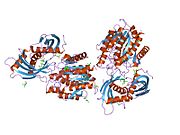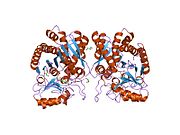CPA4 (gene) – Wikipedia
From Wikipedia, the free encyclopedia
Protein-coding gene in the species Homo sapiens
Carboxypeptidase A4 is an enzyme that in humans is encoded by the CPA4 gene.[4][5][6]
This gene is a member of the carboxypeptidase A/B subfamily, and it is located in a cluster with three other family members on chromosome 7. Carboxypeptidases are zinc-containing exopeptidases that catalyze the release of carboxy-terminal amino acids, and are synthesized as zymogens that are activated by proteolytic cleavage. This gene could be involved in the histone hyperacetylation pathway. It is imprinted and may be a strong candidate gene for prostate cancer aggressiveness.[6]
References[edit]
- ^ a b c GRCm38: Ensembl release 89: ENSMUSG00000039070 – Ensembl, May 2017
- ^ “Human PubMed Reference:”. National Center for Biotechnology Information, U.S. National Library of Medicine.
- ^ “Mouse PubMed Reference:”. National Center for Biotechnology Information, U.S. National Library of Medicine.
- ^ Huang H, Reed CP, Zhang JS, Shridhar V, Wang L, Smith DI (Jul 1999). “Carboxypeptidase A3 (CPA3): a novel gene highly induced by histone deacetylase inhibitors during differentiation of prostate epithelial cancer cells”. Cancer Res. 59 (12): 2981–8. PMID 10383164.
- ^ Hayashida S, Yamasaki K, Asada Y, Soeda E, Niikawa N, Kishino T (Aug 2000). “Construction of a physical and transcript map flanking the imprinted MEST/PEG1 region at 7q32”. Genomics. 66 (2): 221–5. doi:10.1006/geno.2000.6206. PMID 10860668.
- ^ a b “Entrez Gene: CPA4 carboxypeptidase A4”.
External links[edit]
Further reading[edit]
- Strausberg RL, Feingold EA, Grouse LH, et al. (2003). “Generation and initial analysis of more than 15,000 full-length human and mouse cDNA sequences”. Proc. Natl. Acad. Sci. U.S.A. 99 (26): 16899–903. Bibcode:2002PNAS…9916899M. doi:10.1073/pnas.242603899. PMC 139241. PMID 12477932.
- Kayashima T, Yamasaki K, Yamada T, et al. (2003). “The novel imprinted carboxypeptidase A4 gene ( CPA4) in the 7q32 imprinting domain”. Hum. Genet. 112 (3): 220–6. doi:10.1007/s00439-002-0891-3. PMID 12552318. S2CID 45644546.
- Bentley L, Nakabayashi K, Monk D, et al. (2003). “The imprinted region on human chromosome 7q32 extends to the carboxypeptidase A gene cluster: an imprinted candidate for Silver-Russell syndrome”. J. Med. Genet. 40 (4): 249–56. doi:10.1136/jmg.40.4.249. PMC 1735416. PMID 12676894.
- Scherer SW, Cheung J, MacDonald JR, et al. (2003). “Human Chromosome 7: DNA Sequence and Biology”. Science. 300 (5620): 767–72. Bibcode:2003Sci…300..767S. doi:10.1126/science.1083423. PMC 2882961. PMID 12690205.
- Clark HF, Gurney AL, Abaya E, et al. (2003). “The Secreted Protein Discovery Initiative (SPDI), a Large-Scale Effort to Identify Novel Human Secreted and Transmembrane Proteins: A Bioinformatics Assessment”. Genome Res. 13 (10): 2265–70. doi:10.1101/gr.1293003. PMC 403697. PMID 12975309.
- Gerhard DS, Wagner L, Feingold EA, et al. (2004). “The Status, Quality, and Expansion of the NIH Full-Length cDNA Project: The Mammalian Gene Collection (MGC)”. Genome Res. 14 (10B): 2121–7. doi:10.1101/gr.2596504. PMC 528928. PMID 15489334.
- García-Castellanos R, Bonet-Figueredo R, Pallarés I, et al. (2005). “Detailed molecular comparison between the inhibition mode of A/B-type carboxypeptidases in the zymogen state and by the endogenous inhibitor latexin”. Cell. Mol. Life Sci. 62 (17): 1996–2014. doi:10.1007/s00018-005-5174-4. PMID 16091843. S2CID 21858832.



Recent Comments